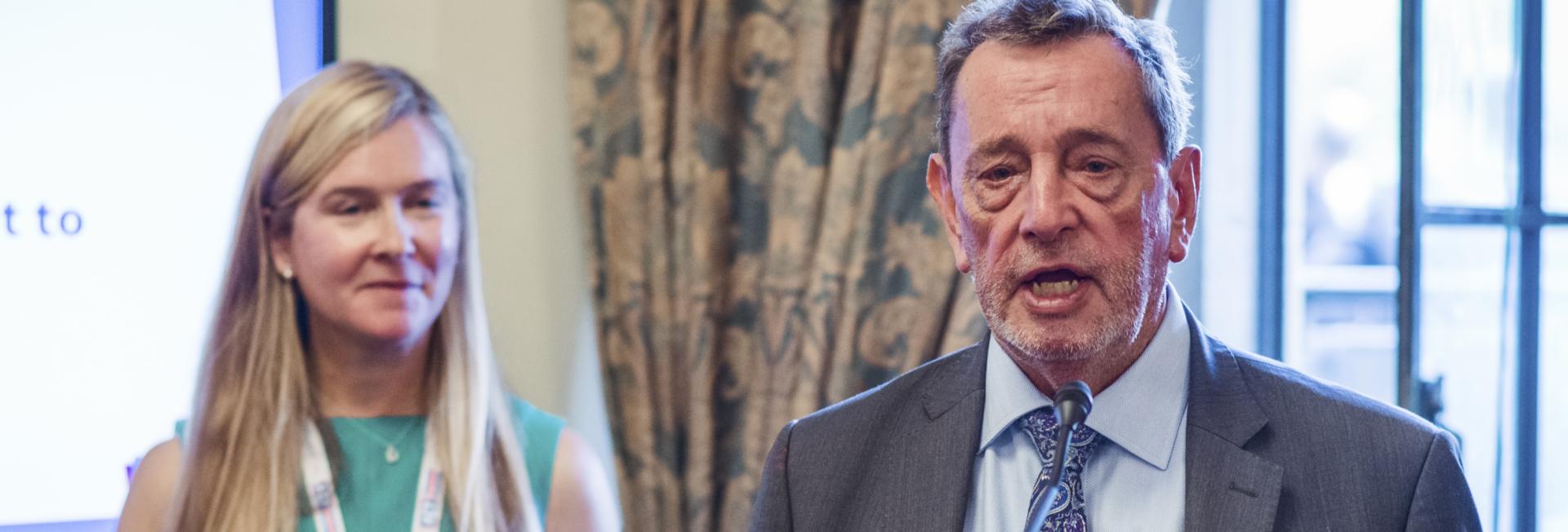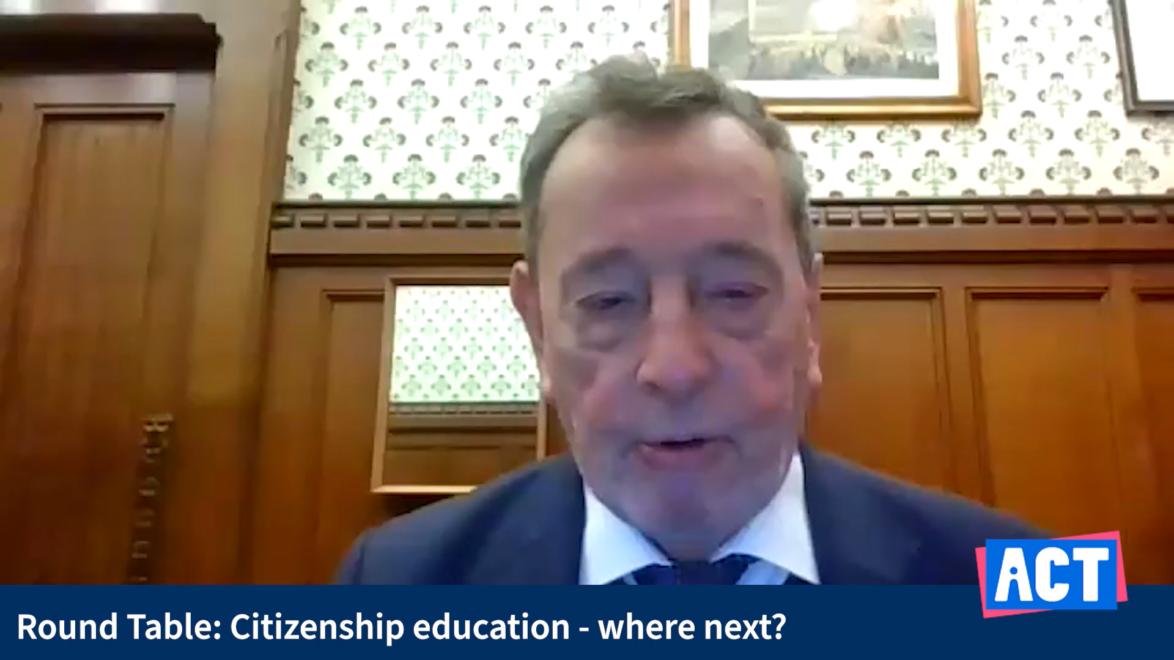
Insights and Strategies from the 'Citizenship Education – Where Next' Panel Discussion with Lord Blunkett
Panel led by Lord Blunkett looked at future of Citizenship through research and teacher-led insights.
ACT’s ‘Citizenship Education – Where Next’ panel discussion led by Lord Blunkett, brought together policymakers, researchers, and educators for a crucial conversation underscored by ACT’s 5 Big Ideas on the future of the subject.
Bringing a diverse range of expertise, speakers included Kingston University’s and ACT Trustee Marcus Bhargava, Middlesex University Professor of Education and ACT Research Consultant Lee Jerome, University of Kent Senior Lecturer in Social Policy Alison Body, Chair of ACT Council Helen Blachford and Head of Priory School’s Stewart Vaughan.
Here’s a recap of what the panel had to say:
Rt. Hon Lord Blunkett (ACT Honorary President):
Leading the panel was ACT’s Honorary President and founding contributor to the Advisory Group for Citizenship and Teaching of Democracy. Pointing to recent election outcomes across the globe that promise to threaten civil liberties, Lord Blunkett centred the notion that Citizenship teaching is vital to democracy. Relating to ACT’s Big Ideas for the future of citizenship teaching, Lord Blunkett emphasised that “we’ve never needed a greater understanding of democracy by young people”. Central to this is the need for a Citizenship education that embeds students with an understanding of where power lies, how institutions do or do not work, and how decisions are taken.
We’ve never needed a greater understanding of democracy by young people.
Rt. Hon Lord Blunkett, ACT Honorary President
Marcus Bhargava (Chair of ACT Trustees and Head of the School for Education, Kingston University)
Marcus Bhargava underscored the Crick report’s enduring concern for British democracy, emphasising the need for engaged citizens to secure its future. Looking ahead, he centres ACT’s proposal for a national education action plan for Citizenship and civic learning based on the five big ideas. Three key questions were posed to the panel: How to strengthen Citizenship education’s presence in all schools, influence policy for better support, and consider the evolving nature of Citizenship education in the face of societal changes over the past 25 years. He emphasised that the focus is on addressing challenges and initiating a broader conversation about the subject’s future in our transformed political, civil, and educational landscape.
Professor Lee Jerome (Middlesex University and ACT Research Team Leader)
Professor Lee Jerome brought an overview of essential research highlights conducted with ACT. In carrying out a comprehensive literature review into Citizenship teaching practices, Lee observed limited improvement in political literacy and reasoning from years 7-10, emphasizing the need for a consistent curriculum and entitlement. Lee also advocated for the inclusion of sustainability in the Citizenship framework and urged for guidance on pedagogical processes crucial to students’ experiences.
Examining school ethos and student perceptions, Professor Jerome found that a positive school ethos, experience of active citizenship, and open classroom climates collectively predicted variations in levels of political trust and voting intentions levels. Lee’s findings underscore the importance of a whole-school approach in Citizenship education, emphasising the roles of ethos, student engagement with the institution, and positive interactions with peers and staff. These findings will be used to inform ACT’s strategic focus on the future of Citizenship education.
Find out more about ACT research here.
Alison Body (Senior Lecturer in Philanthropic Studies and Social Policy, University of Kent)
Alison Body’s research centres on children and young people’s engagement as active citizens, with a primary focus on primary education. In 2021, she secured funding from the ESRC for the ‘Educating for Public Good’ project. Alison contributed her research findings to the panel discussion, with three main findings.
Firstly, she noted that the distribution of Citizenship opportunities across schools is uneven, with “children from more privileged communities having much greater access to opportunities to develop their civic skills” within our education system. Additionally, she noted a prevalent focus on a “personally responsible approach” in active citizenship activities, which can overlook collective participation and critical thinking about political policies and systems. Lastly, she emphasised that active citizenship education is interconnected with lived experiences, existing within an ecosystem of communities, civic actors, and social structures. She argues that teachers, who face multiple barriers in teaching Citizenship, must be celebrated as civic leaders and acknowledged for their role in co-producing meaningful access to active citizenship for children.
Active collective participation and critical challenging of established systems and risks gives children the opportunity to develop skills to consider more critical pathways to change.
Dr Alison Body, University of Kent
Helen Blachford (Chair of ACT Council)
Helen Blachford has played a pivotal role in shaping Citizenship education across the Bohunt Education Trust where she serves as Director of Personal Development. Over a five-year span, she has championed a Citizenship education programme that has fostered student connections across schools, prioritised co-planning, advanced a greater understanding of intersectionality and the role it plays in active citizenship, and promoted CPD for educators in handling controversial issues and navigating political impartiality.
Helen put forward the case that crucial to a forward-thinking curriculum is ensuring content is tailored by region and students’ lived experience. Helen also advocated for customising teaching to align with issues that are relevant to specific areas and demographics.
Ensuring that our content is tailored by region and by the students lived experience helps us to equip our young people for democratic life in a rapidly changing world.
Helen Blachford, Chair of ACT Council
Stewart Vaughan (Head of the Priory School, Bohunt Education Trust)
Stewart, Head of the Priory School, highlighted that his school’s vision centres on students leaving as critical thinkers engaged with communities on local, national, and international levels. Stewart prioritises Citizenship education, making it a fixture on each student’s timetable every year. Stewart underscored the role of Citizenship in addressing post-Covid attendance challenges, emphasising its capacity to reconnect disenfranchised students with society and the school’s relevance. Citizenship, beyond its curriculum content, is portrayed as a catalyst for building connections and fostering a sense of belonging. In the face of a rapidly changing world, Stewart sees Citizenship as providing the essential “foundation stones” for students to understand and critically analyse emerging political and social changes, be it global conflicts or advancements like AI.
You build culture with Citizenship at the very heart of your personal development - at the very heart of your curriculum.
Stewart Vaughan, Head of the Priory School
Summary
The ‘Citizenship Education – Where Next’ panel discussion, spearheaded by Lord Blunkett and featuring a diverse range of experts, illuminated the critical path forward for Citizenship education. Emphasising the urgency of fostering engaged citizens for the preservation of democracy, speakers advocated for a national education action plan based on ACT’s 5 Big Ideas. From the necessity of political literacy and understanding power structures, to the call for a consistent curriculum and inclusion of sustainability, the discussion underscored the multifaceted challenges and opportunities in shaping the future of Citizenship education. The collective insights provided a comprehensive roadmap for navigating the evolving Citizenship education landscape in the face of societal transformations.




